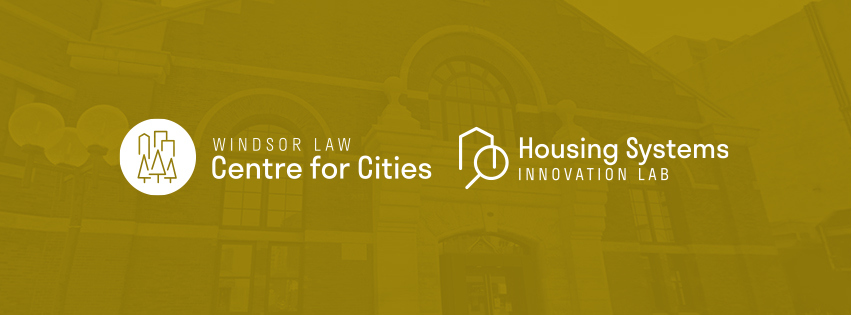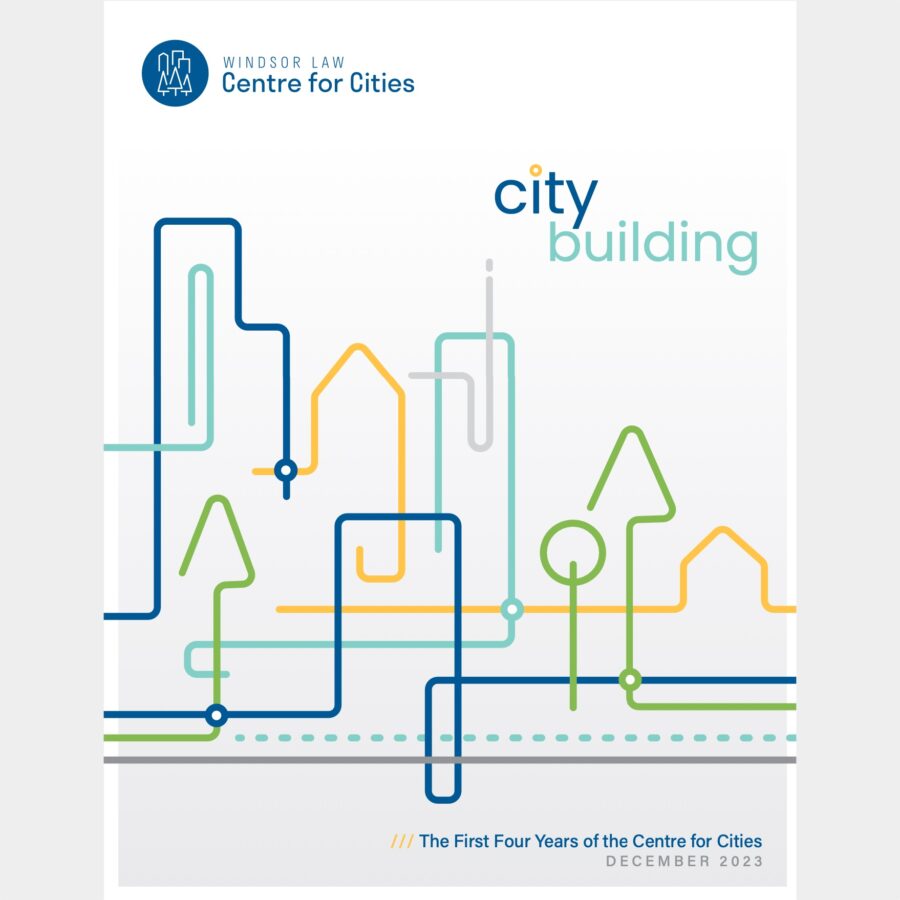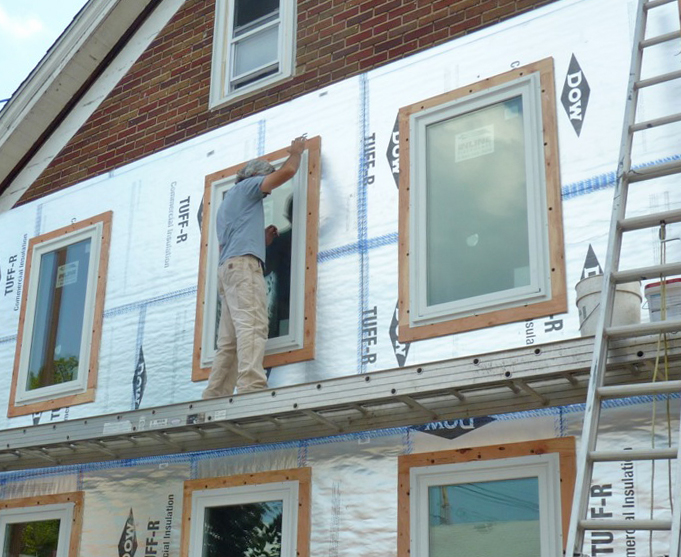
Climate Blog: The City of Windsor’s Residential Deep Energy Efficiency Retrofit (R-DEER) Program: A Model for Municipal Retrofit Programs?
(22 February 2021) By Mallory Allan.
When buildings use energy, that energy can produce greenhouse gas emissions (GHGs). These emissions could be onsite, such as the carbon dioxide that is given off when natural gas is burned in a residential water heater, or they can be “upstream”, meaning the emissions that are produced in the process of generating energy and transporting it to the building. Regardless of the source, inefficient buildings emit more GHGs than efficient ones. A 2017 report from the Institute on Municipal Finance and Governance (IMFG) notes that the three sectors that create the majority of urban GHG emissions are energy use in buildings, transportation, and waste management. By making our buildings more energy efficient, we can reduce the GHGs they generate and thus, the impact our buildings have on climate change.
Energy use in buildings is a considerable challenge to address, and the housing stock in Windsor poses no exceptions. The average construction date of a home in Windsor is 1955, a time when building codes included no insulation requirements. Windsor homes use 35% more energy than the average home in Ontario. In fact, the residential sector contributes to 22% of community GHG emissions in Windsor. Single family homes account for 80% of residential GHGs by building type in Windsor, with homes built prior to 1955 accounting for 42% of energy usage.
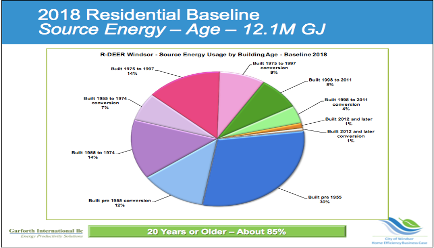
Source: R-DEER Business Case Report
To target this issue, residential energy efficiency was prioritized in Windsor’s 2017 Community Energy Plan. Addressing home energy efficiency requires retrofitting. Broadly speaking, retrofitting is the addition of new features to older systems. In the context of climate change & residential energy efficiency, retrofitting involves improvements that reduce energy consumption. While minor retrofits are less disruptive to occupants and less expensive upfront, they do not offer the same energy savings as deep retrofits. A deep energy retrofit is a whole-building analysis and construction process that achieves much larger energy cost savings and fundamentally enhances building value. The City of Windsor hopes to achieve deep retrofitting in 80% of Windsor homes by 2041 with the R-DEER Program.
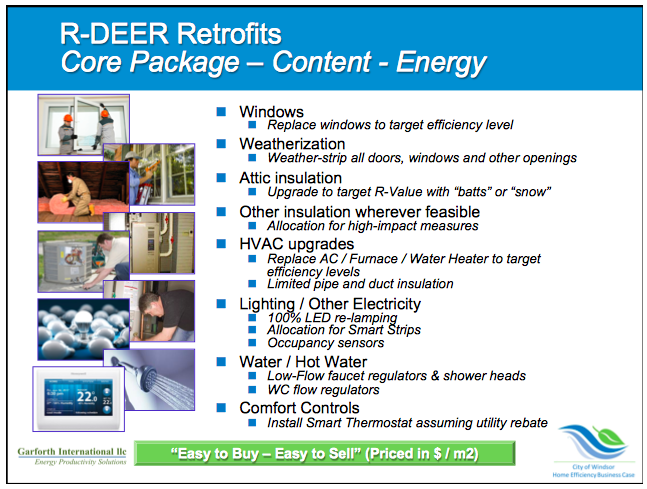
The R-DEER (Residential Deep Energy Efficiency) Proposal:
R-DEER is proposed as a voluntary program for homeowners in Windsor. The program is designed to offer standardized home retrofit packages to address areas of high energy consumption in homes (water heaters, heating, insulation, windows, etc.). The proposal would not require energy audits; participants are eligible if they meet established criteria. According to the City’s Business Case Report, the energy cost savings for homeowners in the first year are estimated to be at least as high as their annual payment to fund the retrofit.
The R-DEER program has not received full council approval yet. The City intends to conduct a program design study to strengthen the business case. The City has also recently applied to the Federation of Canadian Municipalities Community Energy Financing Program to fund this study. If all goes well, the City hopes to launch the program in 2021.
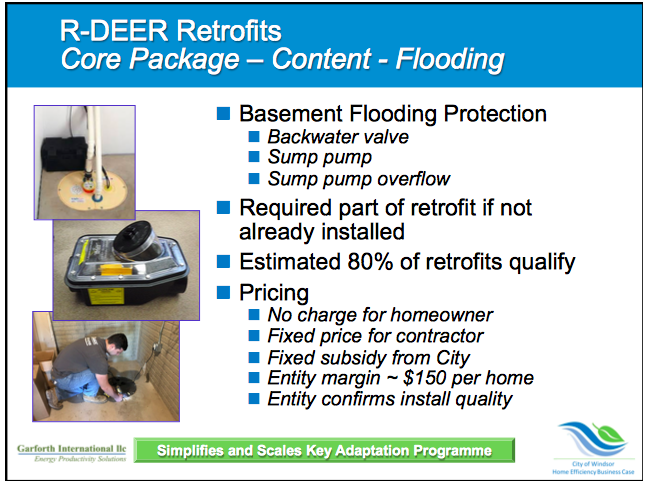
Funding for R-DEER: Local Improvement Charges (LICs)
Traditional rebate programs, such as the Enbridge Home Efficiency Rebate, provide customers with cash-back after upgrades are complete. R-DEER will not require upfront investments by homeowners and the proposal intends to remove the traditional requirement of energy audits. Instead, the program would leverage the 2012 changes to the Municipal Act, 2001 (O. REG 322/12)that allow municipalities to use local improvement charges (LIC).
If a homeowner wishes to participate, they enter into a contract with the City to apply the LIC as a specific charge to their property tax bill. The LIC is removed once the cost of the retrofit is recovered. This makes it more feasible for homeowners to undertake these upgrades and ties the value of the retrofits to the property. If the home is sold, the LIC continues with the new homeowner until the cost is recovered.
One of the main challenges with LICs is the limited appetite of traditional mortgage providers to agree to retrofit loans tied to property tax. Currently, not all mortgages insured by the Canadian Mortgage and Housing Corporation (CMHC) would be eligible for LIC financing. However, solutions to this are proposed in IMFG’s recent Final Report of the Expert Panel on Sustainable Finance.
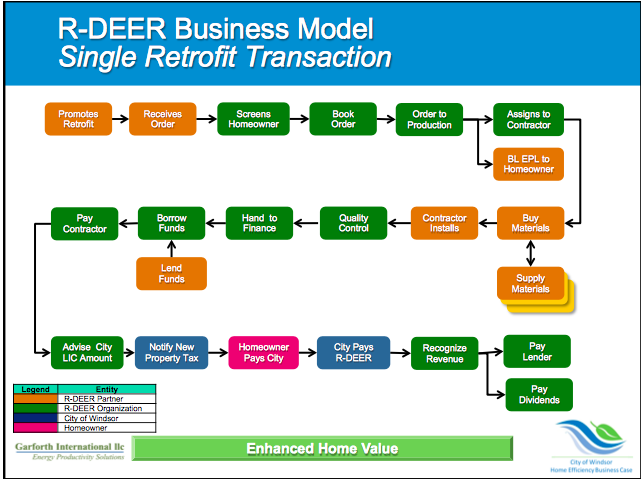
Is R-DEER a Model for Other Municipalities?
The extent of the R-DEER Program’s success in Windsor remains to be seen. However, based on the findings of the City’s R-DEER Business Case Report, there are many benefits to offering standardized energy retrofits in high volumes through LICs. Firstly, contractors benefit from increased project predictability and can be assured of higher project volumes. Homeowners also benefit from a simplified transaction, guaranteed pricing, and a pre-financed retrofit that offers simple billing and payment on the property’s tax bill.
The benefits of this proposal extend beyond reduced GHG emissions and improved residential energy efficiency. As stated in the City of Windsor’s Climate Emergency Declaration, “implementing climate action and making a transition to a low-carbon economy also represents a significant opportunity to stimulate economic growth, increase job opportunities and develop new technologies.” It is estimated that the R-DEER program will create significant numbers of jobs in Windsor by 2025. Further, by 2041, annual total residential cost savings are estimated to be between $100M to $180M as a direct result of significant electricity, gas and water savings.
In cities with older housing stocks and cash-strapped residents (especially post-pandemic), Windsor’s standardized approach and use of the LIC mechanism could provide a model to be followed for municipal retrofit programs.
Mallory Allan is a Windsor Law JD student and a member of the Windsor Law Cities and Climate Action Forum policy clinic.
Opinions expressed in blog posts are those of the author and do not reflect an official position of the Windsor Law Centre for Cities or the Cities and Climate Action Forum policy clinic.
